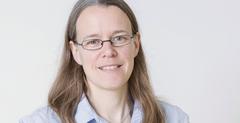URL: https://www.desy.de/news/news_search/index_eng.html
Breadcrumb Navigation
DESY News: Kerstin Tackmann appointed physics coordinator of the ATLAS Collaboration
News
News from the DESY research centre
Kerstin Tackmann appointed physics coordinator of the ATLAS Collaboration
The international ATLAS collaboration at CERN has recently elected Kerstin Tackmann, Lead Scientist at DESY and Professor at Universität Hamburg, as its next Physics Coordinator. Physics coordination is a key task in the collaboration and DESY is one of the few institutes to hold the post for the second time: DESY scientist Klaus Mönig was Physics Coordinator from October 2018 to September 2020.
The ATLAS experiment at CERN near Geneva is currently the largest experiment in particle physics and collects data from events that occur during proton-proton collisions at the Large Hadron Collider (LHC). Scientists use these data to analyse the fundamental components of matter. The collaboration with approximately 3000 members from 182 institutes in 42 countries has many tasks: operating and sometimes modernising the experiment with its many sub-detectors, and analysing the extremely complex and large amounts of data.ATLAS is a so-called multi-purpose experiment, which means that many different questions of particle physics are analysed simultaneously. To do this, the collaboration has 16 working groups that prepare and subsequently analyse the data. These analysis groups cover a wide range of high-energy physics, from precise measurements of known processes to searches for new phenomena beyond the standard model of particle physics. The standard model is the fundamental theory that very successfully describes the results of experiments to date. The latest component to be found was the Higgs particle, which was discovered in 2012 by, among others, the ATLAS experiment and is still being investigated in detail by analysis groups. However, there are phenomena in the Universe that we observe, but that cannot be explained by the standard model - the explanations for these observations must lie outside the current theory. The collaboration is currently working on around 450 different physics analyses in parallel.
The work of the various groups must be coordinated with each other and with other areas of the experiment. It is important to ensure that the collaboration delivers important and good scientific results. In addition, you have to ensure that the data is calibrated and the calibrations are understood, that common tools are available for data analysis and that the data sets required for analysis are provided with simulated data. Kerstin Tackmann will take on these tasks in future. From October 2024, she will initially act as deputy for one year before becoming Physics Coordinator in October 2025.
"The coming years will be particularly exciting for the ATLAS experiment," says Tackmann. "In 2022, another phase (Run3) of data collection started, which will run until the end of 2025. This data which will be the subject of analysis for many years to come will take ATLAS into unexplored areas - in search of new processes and particles that could change our understanding of the fundamental building blocks of matter." After that, the experiment will be upgraded, which is already being worked on at full speed, including in the Detector Assembly Facility at DESY.




